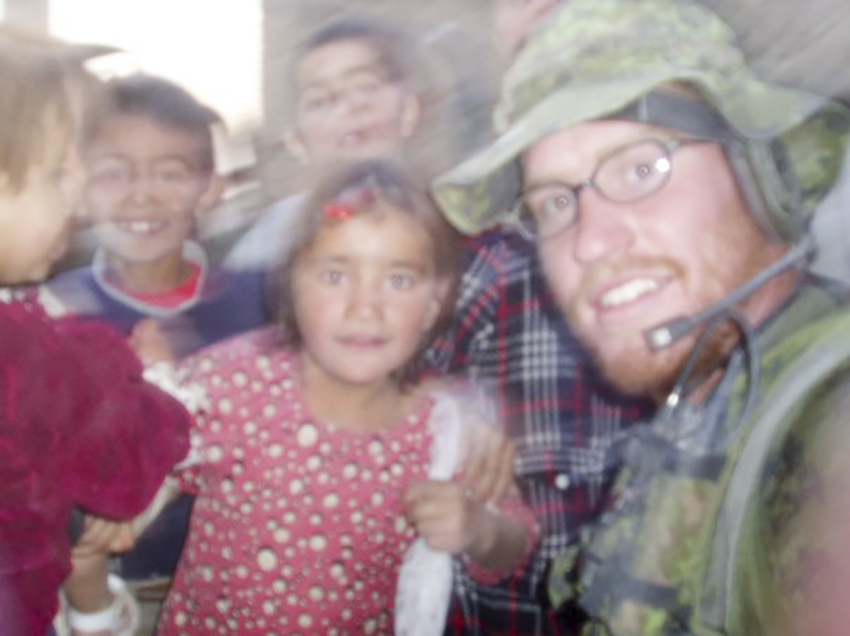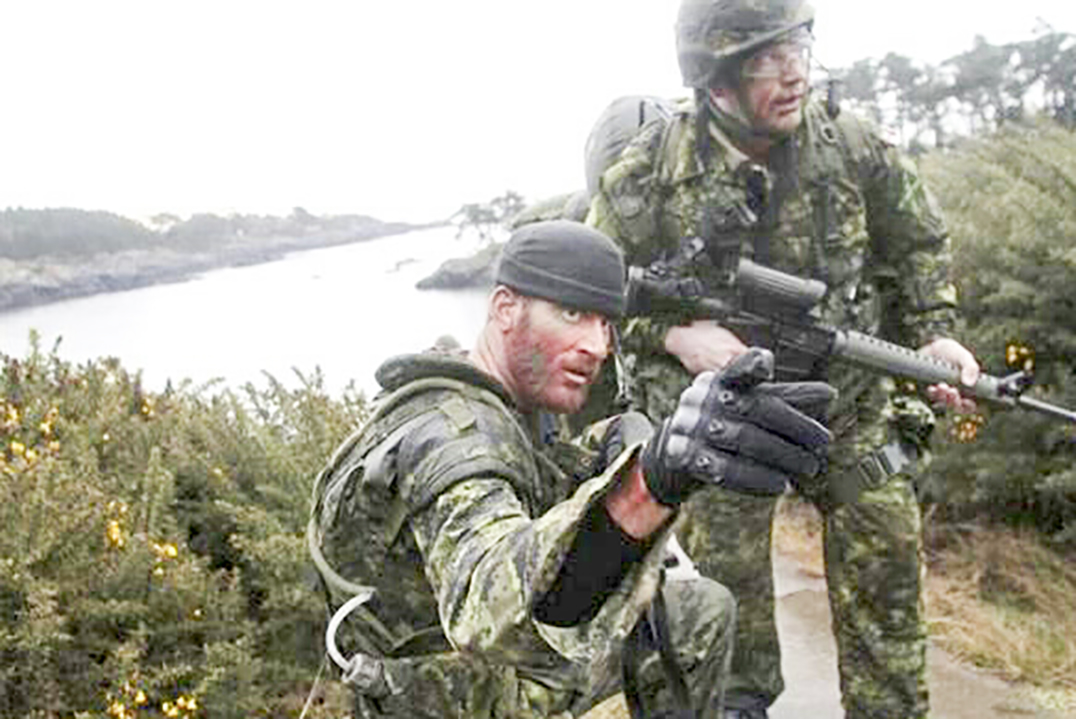KAMLOOPS—It’s a long way from Meldrum Bay to Bosnia and Afghanistan, both in geography and culture, but a year after he joined the Canadian infantry at age 17, an 18-year-old Jeremiah White, son of Whitesea Cottages founders Fred and Diane White, was Private White, an integral part of the fabled Royal Canadian Regiment (RCR) light infantry lugging his kit through some of the tensest locales on the globe.
“I joined the light infantry, the RCRs and did my basic at St. Jean, Quebec and then what they call battle school in Meaford, Ontario,” he recalled. “I joined at 17 and they don’t let you deploy until you are at least 18.”
The RCRs are the oldest infantry unit in Canada. “There is lots of tradition, but I am not that into that sort of thing,” he admitted. In 2001-2002 the light infantry served a critical role as “sort of a special forces, the tip of the spear if you like.” That role is among the hardest to be found in the Canadian military establishment.
Mr. White served in the regular forces for six years and then continued as part of the reserves for another eight. Today he is a tree faller in the forests of British Columbia.
When he arrived in Bosnia, the atmosphere was still quite tense, but the shooting war had largely abated. “It was toward the end,” he said. “We were more in a peacekeeping role. The political side was happening at that time.”
On his only day off during that posting Mr. White was on a day pass in Croatia when he glanced up at the television in a café. It was September 11, 2001. “I remember thinking to myself ‘I really have to see that movie when it comes out’,” he said. “I didn’t realize at the time the television was on CNN.” When he realized the import of the images flashing across the screen, his next thought was “I guess we are at war.”
So much for a day off. Mr. White was soon back at base. “Everyone was in body armour, full stand to,” he said. The high status alert remained in place for the next couple of weeks. Meanwhile, the job continued.

“We were more ‘presence patrolling,’ checking the locals and making sure everything NATO had put in place was still working,” he said, “but we were involved in a bank robbery.”
Get visions of ‘Kelly’s Heroes’ out of your head, however, this was a legit incursion with a political nuance to it. “We were just on the periphery assisting the German special forces,” he said. The bank in question was financing a banned political party and the NATO forces went in to confiscate their assets and to take them off-line. “We were in the same camp as the Germans,” recalled Mr. White. He was on a four-month tour of duty in Bosnia before cycling home and passing on what he had learned as a mountain instructor.
As a mountain warfare specialist, Mr. White was trained as a paratrooper, jumping from a plane “around 20 to 25 times, I’m not sure.” He described the training regime as being “a difficult course,” and as the light infantry has traditionally served in a rapid response role, that training included helicopter assault techniques.
In 2004, Mr. White was sent into Afghanistan as part of the NATO intervention in that country. “The Princess Patricia Light Infantry was part of Operation Anaconda,” he said. “We went in with the US initially and were the first ones to roll into the capital Kabul as part of NATO.”
Among their first tasks was the building of Camp Julien. “We built it between the King and Queen’s palaces,” he said. The camp was named after Lance Corporal George Patrick Julien, a Canadian soldier who was awarded the Military Medal as a private for his actions at Hill 187 in Korea in May 1953. At its height, Camp Julien housed 2,000 Canadian soldiers and over 400 civilian workers. The site closed in November 2005 and was handed over to the Government of Afghanistan. In April 2007 Camp Julien was reopened and designated as the new home for the COIN (Counterinsurgency) Academy. It is a multinational organization that runs a week-long course designed to teach military leaders the basics of counterinsurgency operations.
Most of Mr. White’s activities while in Afghanistan were to take place in the vicinity of Kabul.
The soldiers knew little about their deployment at the time they went into Afghanistan, but the operational name was obviously not designed to instill complacency. “It was called ‘KIA Exercise’,” he said. “We were very lightly equipped at the time.”
The Canadian troops were decked in their standard green camouflage, even though the terrain was more suited to the desert brown they later adapted. The commanding officer at the time intimated that standing out in the green was intended to differentiate the troops from the Americans. A puzzling concept which turned out to have a major flaw.
“We asked the locals whether it made any difference,” he recalled. “They told us no, we were all armed and foreigners, to them we were all the same.”
The workload was very intense, with each day comprising two to four patrols. “You make peace with the situation,” said Mr. White, who lost three friends during his time in Afghanistan. “You come to expect it. Besides, you were young so you didn’t really comprehend danger the same way.”
Although they were travelling in “flimsy Jeeps” at the time, hardly proof against the harsh desert heat, let alone an improvised explosive device, their light equipment had an unanticipated upside.
“They thought we were all special forces because who else would be crazy enough to drive around in light Jeeps,” he laughed.
Mr. White’s deployment and return took place at the tail end of the “suck it up Princess” school of thought on dealing with the trauma of combat and the sudden transition to more peaceful environs, but he noted that since that time the military’s approach has underwent a major change in attitude. Soldiers now have a week of decompression time in Cyprus in which to acclimatize to the change.
“They have studies now that show that the constant adrenalin flow actually enlarges that lobe of the brain that deals with the flight or fight response,” he said. Coming out of the intensity of combat zones leaves that portion of the brain struggling to deal with the lack of stimulus. “That makes a lot of sense to me.”
Today Mr. White, who mustered out as Master Corporal White, now works in the forests of British Columbia as a tree faller, which helps to keep some stimulus going. “It can be a pretty intense job,” he admitted. “It works for me.”






